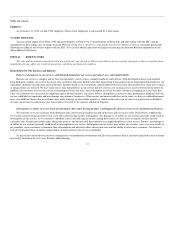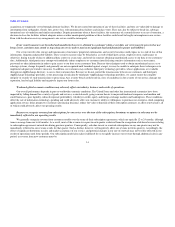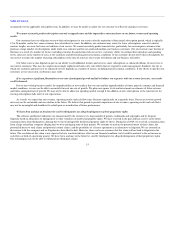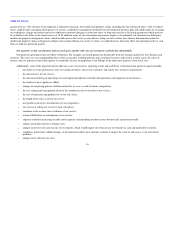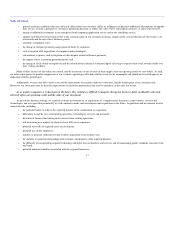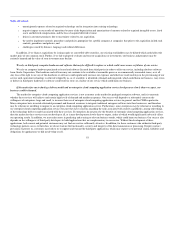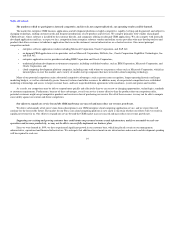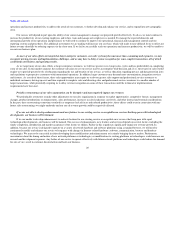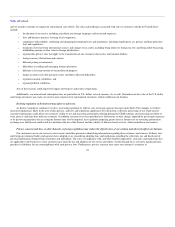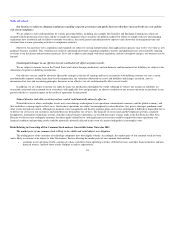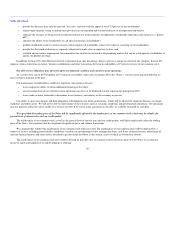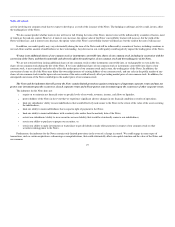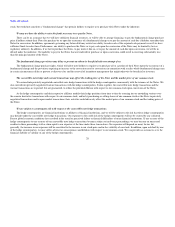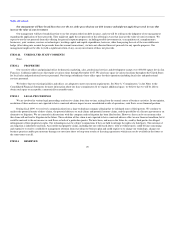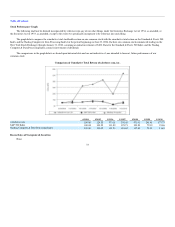Salesforce.com 2009 Annual Report Download - page 26
Download and view the complete annual report
Please find page 26 of the 2009 Salesforce.com annual report below. You can navigate through the pages in the report by either clicking on the pages listed below, or by using the keyword search tool below to find specific information within the annual report.
Table of Contents
resist providing the personal data necessary to allow our customers to use our service effectively. Even the perception of privacy concerns, whether or not
valid, may inhibit market adoption of our service in certain industries.
For example, in the United States regulations such as the Gramm-Leach-Bliley Act, which protects and restricts the use of consumer credit and
financial information, and the Health Insurance Portability and Accountability Act of 1996, which regulates the use and disclosure of personal health
information, impose significant requirements and obligations on businesses that may affect the use and adoption of our service. The European Union has also
adopted a data privacy directive that requires member states to impose restrictions on the collection and use of personal data that, in some respects, are far
more stringent, and impose more significant burdens on subject businesses, than current privacy standards in the United States.
All of these domestic and international legislative and regulatory initiatives may adversely affect our customers' ability to collect and/or use
demographic and personal information from their customers, which could reduce demand for our service. Many other jurisdictions have similar stringent
privacy laws and regulations.
In addition to government activity, privacy advocacy groups and the technology and other industries are considering various new, additional or different
self-regulatory standards that may place additional burdens on us. If the gathering of personal information were to be curtailed in this manner, CRM solutions
would be less effective, which may reduce demand for our service and harm our business.
We are dependent on our management team and development and operations personnel, and the loss of one or more key employees or groups could
harm our business and prevent us from implementing our business plan in a timely manner.
Our success depends substantially upon the continued services of our executive officers and other key members of management, particularly our Chief
Executive Officer. From time to time, there may be changes in our executive management team resulting from the hiring or departure of executives. Such
changes in our executive management team may be disruptive to our business. We are also substantially dependent on the continued service of our existing
development and operations personnel because of the complexity of our service and technologies. We do not have employment agreements with any of our
executive officers, key management, development or operations personnel and, therefore, they could terminate their employment with us at any time. We do
not maintain key person life insurance policies on any of our employees. The loss of one or more of our key employees or groups could seriously harm our
business.
Because competition for our target employees is intense, we may not be able to attract and retain the highly skilled employees we need to support
our operations and growing customer base.
In the technology industry, there is substantial and continuous competition for engineers with high levels of experience in designing, developing and
managing software and Internet-related services, as well as competition for sales executives and operations personnel. We may not be successful in attracting
and retaining qualified personnel. We have from time to time experienced, and we expect to continue to experience, difficulty in hiring and retaining highly
skilled employees with appropriate qualifications. In addition, job candidates and existing employees often consider the value of the stock awards they receive
in connection with their employment. If our stock price performs poorly, it may adversely affect our ability to retain highly skilled employees. In addition,
since we expense all stock-based compensation, we may periodically change our stock compensation practices, which may include reducing the number of
employees eligible for options or reducing the size of equity awards granted per employee. If we fail to attract new personnel or fail to retain and motivate our
current personnel, our business and future growth prospects could be severely harmed.
23


